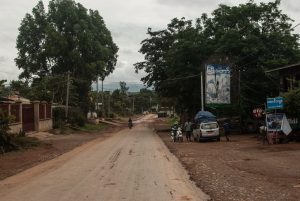Indonesia and Singapore have condemned an armed attack on a humanitarian convoy organized by the Association of Southeast Asian Nations (ASEAN) in eastern Myanmar and once again called for an end to the country’s conflict.
Local news outlets reported on Monday that the aid convoy came under fire yesterday on a road between the Shan State capital of Taunggyi and Hsihseng township to the south. The convoy was reportedly en route to a meeting with the Pa-O National Liberation Army (PNLA), an ethnic armed organization based in the area, about providing assistance to internally displaced civilians. It included Singaporean and Indonesian embassy officials, as well as junta officials and representatives from the ASEAN Coordinating Centre for Humanitarian Assistance on Disaster Management, or AHA Center.
The Myanmar military unsurprisingly blamed the attack on anti-junta forces – what it described as “terrorists” – though the opposition National Unity Government says that it had “absolutely nothing to do” with the attack. According to Radio Free Asia, the junta-aligned Pa-O National Organization (PNO) accused its local rival, the PNLA, of launching the attack. The PNLA in turn blamed “a local militia allied to the junta,” in RFA’s paraphrase.
In a statement yesterday, a spokesperson for Singapore’s Foreign Ministry condemned the attack and said that it was “critical to safeguard the safety of humanitarian and diplomatic personnel, to ensure that they can continue their operations and provide necessary aid to those in need.” It added, “Only constructive dialogue among all key stakeholders in Myanmar can facilitate a peaceful solution in the interests of the people of Myanmar.” The spokesperson said that two staff from the Singaporean Embassy were in the convoy and had returned safely to Yangon.
Indonesian President Joko “Jokowi” Widodo also addressed the attack in a press conference yesterday in Labuan Bajo, the small fishing town that is this week hosting the 42nd ASEAN Summit and related meetings, where Myanmar will once again be high on the agenda.
“Stop using force, stop violence because it’s the people who will be victims. This condition will not make anybody win,” he said, Reuters reported, adding that the attack would not deter Indonesia’s – and ASEAN’s – efforts to end the violence.
Last week, Indonesian Foreign Minister Retno Marsudi revealed that as ASEAN chair, her government was making quiet progress on implementing the organization’s Five-Point Consensus peace plan. Indonesian diplomats have now held more than 60 “engagements” with the military administration, the opposition National Unity Government (NUG), and various ethnic armed organizations, she said, in a bid to broker the inclusive political dialogue that is the main goal of the Consensus. “Indonesia is using non-megaphone diplomacy, this aims to build trust with all stakeholders, so they want to talk to us,” she said at a press conference on Friday.
Among the other five points of consensus was the immediate cessation of violence and the coordination of humanitarian aid via the AHA Center. The latter has been particularly controversial given that ASEAN continues to view the military administration as the de facto government of Myanmar and has directed its aid shipments through its channels.
Whoever carried out the attack, it proves the point made by many critics of the Five-Point Consensus, that ASEAN’s decision to deliver humanitarian aid through the military junta was a highly risky venture. While most criticisms centered on the likelihood that the junta would manipulate aid efforts for its own political benefit, the other reality is that it may not be in effective control of the areas where the humanitarian needs are most acute.
Either the attack was carried out by opponents of the junta, or it was launched by a group formally aligned with it. Both possibilities raise serious questions about the military’s inability to guarantee the safety of an ASEAN humanitarian convoy, even in relatively close proximity to a major state capital.













